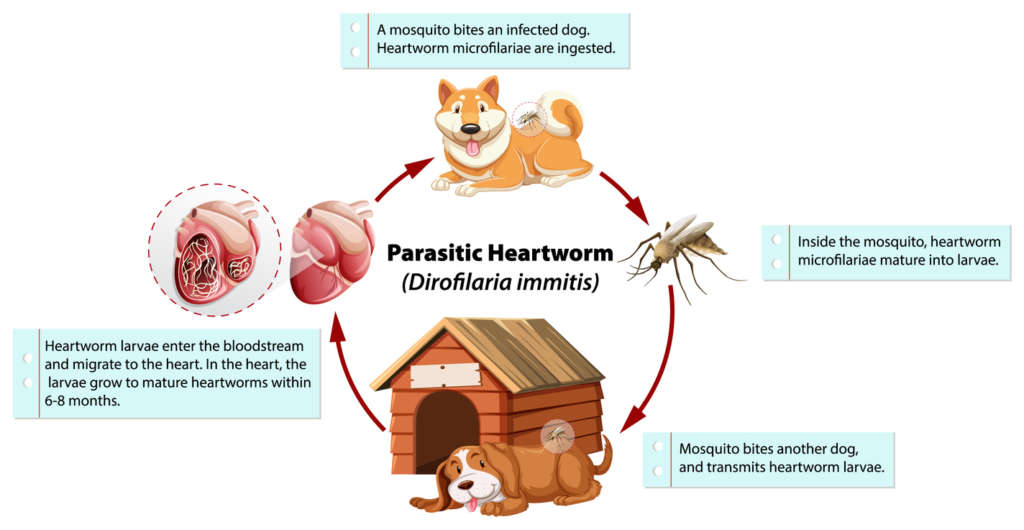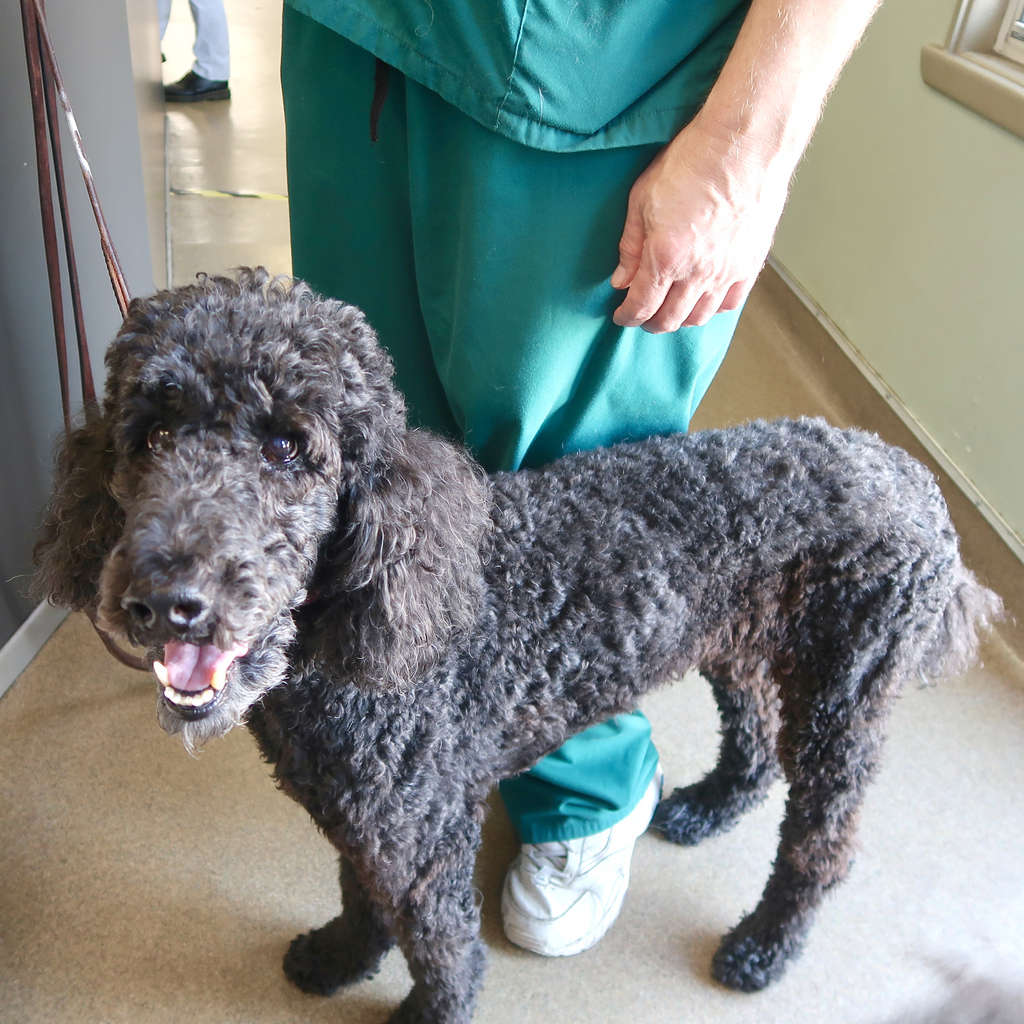Your veterinarian will always recommend monthly heartworm preventative medication to keep your pup’s ticker in tip-top shape, but the vast number of options rivals a Cheesecake Factory menu. So where do you start?
Which Dogs Should Take Heartworm Preventatives Year-Round?
- All dogs over the age of 8 weeks old in endemic areas1 (where heartworm disease is common).
- For dogs in areas where heartworm disease is not endemic, seasonal heartworm prevention is occasionally used.
If not consistently on heartworm prevention and over the age of 6 months, dogs need to be tested for heartworm before starting a monthly preventative1 (annual testing is ideal2—it’s a simple blood test). Check out this heartworm incidence map for the US to see how common the disease is in certain areas.


What Is Heartworm Disease?
Heartworm disease is the infestation of Dirofilaria immitis (say it 3 times fast). The adult worms live in the pulmonary artery2–5, which is the vessel taking blood from the right side of the heart to the lungs. Most dogs with heartworm are not symptomatic2, which is why yearly screenings are required to catch an infestation to determine whether pups should start or continue their medication.


Lack of symptoms doesn’t mean the dog’s body is spared for damage, though. Inflammation of the vessels in the lungs and surrounding lung tissue can lead to scarring, which is permanent2–5. Left untreated, heartworm disease can lead to more serious conditions2–5, such as:
- Pulmonary hypertension
- Right-sided heart failure
- Caval syndrome (a life-threatening condition caused by a mass of heartworms blocking blood flow)
- In rare cases, liver and kidney disease
Treatment of heartworm disease requires killing the adult worms. When these worms die, they go into the vessels in the lungs downstream until they get stuck, also known as an embolus2–5. Even if the dog endures this without you noticing any issues during treatment, dealing with these dead worms leaves permanent damage in the lung tissue. This is why prevention is by far the best option for your dog’s long-term health.
How Do Dogs Get Heartworm Disease?
Our good friend the mosquito is to blame. Mosquitos carry microfilaria, or baby heartworms, from one animal to another2–5. And yes, your long-haired, indoor dog, like a Pomeranian, can still be bitten by a mosquito. It only takes one bite!


Heartworm Preventative Options
All heartworm preventative options are from the same group of medications: macrocyclic lactone antibiotics. These work by killing immature worms before they become established in the heart1.
The worms are usually in this stage of development between 2 weeks and 4 months AFTER the mosquito bite1–2. All forms of heartworm preventative medications are very effective when given as directed, but skipping doses reduces their effectiveness. As an added bonus, most preventatives provide protection for other parasites as well. All heartworm preventative medications require a prescription from your veterinarian, so don’t put off that next check-up!
- Oral medications are given by feeding to dogs, but require pup parents to remember to give them monthly. It’s easy to miss a dose and cause a lapse in coverage, so set a quick reminder on your phone for your dog’s sake. Note: Only some oral heartworm preventatives can be given to animals with food allergies due to flavor additives.
- Topical medications are applied directly to your dog’s skin, but also require that monthly repetition to keep pups fully protected. Dogs also cannot get wet (or groomed by humans or other animals) where the product was applied.


- Injectable medications are given under the skin by veterinary professionals. The benefit of these medications is that they can be given once or twice yearly. This, combined with reminders from your veterinarian, can help prevent accidentally skipping doses.
These products only cover hookworms and heartworms, and they do require a visit to the veterinarian to get them, which may make them less ideal for some families.
Common Concerns With Heartworm Preventatives
- Collies have been known to have neurologic side effects, though this is only as a result of massive overdoses of any heartworm preventative product1. Any of these products can be safely used at the recommended doses1. This is most commonly a concern when collies are around when deworming large animals (think cows or other livestock) with products that contain the same active ingredients.
- Resistance to preventatives has been noted in recent years6. Resistance genes are possibly emerging because of “slow kill treatment” of known infections or inconsistent use of preventatives, but unlikely from routine year-round use of preventatives in dogs without existing infections6.
Here is a chart that goes over the specifics of current heartworm preventative options:
| Active Ingredients | Brand Names | How is it Given? | Frequency | Also Treats | Age Range | Weight Range |
|---|---|---|---|---|---|---|
| Ivermectin | Heartgard, Iverhart, Tri-Heart | Swallowed (oral) | Every 30-Days | n/a | Over 6 weeks | n/a |
| Ivermectin & Pyrantel pamoate | Heartgard Plus, Iverhart Plus, Tri-Heart Plus | Swallowed (oral) | Every 30-Days | Roundworms & Hookworms | Over 6 weeks | n/a |
| Ivermectin, Pyrantel pamoate, & Praziquantel | Iverheart Max | Swallowed (oral) | Every 30-Days | Roundworms, Hookworms, & Tapeworms | Over 8 weeks | Over 6 lbs |
| Milbemycin oxime | Interceptor, MilbeGuarde | Swallowed (oral) | Every 30-Days | Roundworms, Hookworms, & Whipworms | Over 4 weeks | Over 2 lbs |
| Milbemycin oxime & Praziquantel | Interceptor Plus | Swallowed (oral) | Every 30-Days | Roundworms, Hookworms, Whipworms, & Tapeworms | Over 6 weeks | Over 2 lbs |
| Milbemycin oxime & Lufenuron | Sentinel | Swallowed (oral) | Every 30-Days | Roundworms, Hookworms, Whipworms, & Fleas | Over 4 weeks | Over 2 lbs |
| Milbemycin oxime, Lufenuron, & Praziquantel | Sentinel Spectrum | Swallowed (oral) | Every 30-Days | Roundworms, Hookworms, Whipworms, Tapeworms, & Fleas | Over 6 weeks | Over 2 lbs |
| Milbemycin oxime, Lufenuron, & Spinosad | Trifexis | Swallowed (oral) | Every 30-Days | Hookworms, Roundworms, Whipworms, & Fleas | Over 8 weeks | Over 5 lbs |
| Selamectin | Revolution, Selarid | Apply to skin (topical) | Every 30-Days | Fleas, Ticks, Ear mites, & Sarcoptic Mange | Over 6 weeks | n/a |
| Moxidectin | Proheart 6; Proheart 12 | Injected by vet staff | Every 6 months; Every 12 months | Hookworms | Over 6 months; Over 1 year | n/a |
| Moxidectin & Imidacloprid | Advantage Multi | Apply to skin (topical) | Every 30-Days | Roundworms, Hookworms, Whipworms, Fleas, & Sarcoptic Mange | Over 7 weeks | Over 3 lbs |
Why Do I Need To Test My Dog For Heartworms?
Veterinarians recommend annual testing of all dogs for heartworm disease2,5. Dogs with heartworm disease will receive heartworm prevention as part of treatment, but after taking other medications in many cases. The reason for this is to treat the worms for a bacteria (Wolbachia pipientis) that most of them carry, before giving medication to kill them2.


This prevents the bacteria from being released into the dog when the worm dies, resulting in increased inflammation in the dog’s lungs2. Some dogs are also placed on medications to help with inflammation before starting medications to kill the worms.
The following are reasons testing is important to minimize immediate and long-term effects on your dog’s health:
- For dogs that are not on heartworm prevention, the reason is obvious. Your vet needs to determine if your dog has the disease or not before starting treatment.
- For dogs on year-round heartworm prevention, testing ensures the medications are effective and that there isn’t a resistant strain develop in your dog. And let’s be honest, who hasn’t been late once for the monthly dose? It happens to the best of us!
- For dogs on seasonal heartworm prevention (not year-round) testing confirms that your dog did not get heartworms during the gap in coverage.
- Even dogs who have undergone heartworm treatment need a test to confirm it was successful.
- The only exception to the rule of testing before treatment is for puppies under 6 months of age. As mentioned above, it takes 6 months for the heartworms to develop into adults during their rent-free stay in the heart, so puppies can’t have an established infection yet2.
How Do Heartworm Tests Work?
There are two types of tests commonly used for screening and diagnosis.
- Antigen tests detect the presence of a protein from the female heartworm in the blood of the dog. This means the dog has to have a mature infection with at least one female worm2. False negatives occur when the worms are not mature enough, with male-only infections, immune system interference, light infections, test malfunctions, or failure to follow appropriate instructions when performing tests2.
- Microfilaria tests detect the presence of microfilaria (baby worms) in the blood of the dog2. This occurs once a dog has an established infestation and the female worms have produced offspring, so when mosquitoes bite the infected dog, they can bring the infestation to the next animal. This requires an infection with both male and female worms. Low microfilaria amounts can result in a false negative2.
An antigen test is typically done first, followed by a microfilaria test to confirm only in positive antigen test cases. In endemic areas, annual microfilaria testing may be recommended annually2,5.
Colleen Ferriman, DVM, is a canine and feline health, wellness, and illness management advocate. She has a combined 10 years of experience in clinical medicine, education, and educational content development. Colleen graduated from Colorado State University as a Doctor of Veterinary Medicine, has worked as a general practitioner, and has contributed to the development of veterinary educational tools. She is also a member of the American Veterinary Medical Association and American Academy of Veterinary Pharmacology and Therapeutics.
Sources
1Atkins CE: Canine Heartworm Disease: Prevention and Treatment. World Small Animal Veterinary Association World Congress Proceedings VIN 2004. Veterinary Association World Congress Proceedings VIN 2004.
2Palermo V, Rishniw M: Dirofilariasis (Heartworm Disease) (Canine). Small Animal Cardiology VIN 2017.
3Kittleson MD: Heartworm infestation and disease (dirofilariasis). Small Animal Cardiovascular Medicine VIN 2005.
4Bonagura JD, Twedt DC: Canine Heartworm Disease. Kirk’s Current Veterinary Therapy XV 2013 Vol 184 pp. 831.
5Current Guidelines for the Diagnosis, Prevention and Management of Heartworm (Dirofilaria immitis) Infection in Dogs. American Heartworm Society 2014.
6Atkins CE: Heartworm Resistance to Macrocyclic Lactones: Disaster, Myth or Wake-up Call? American College of Veterinary Internal Medicine VIN 2015.






